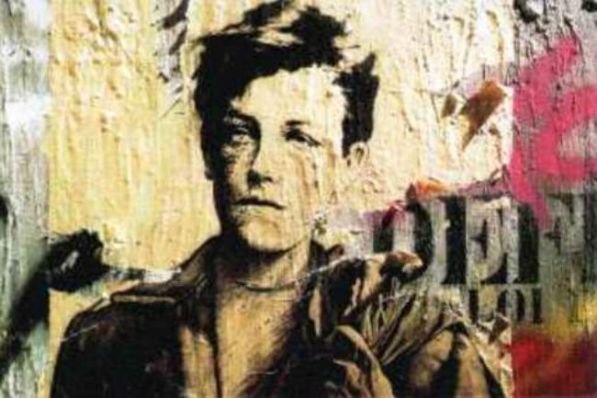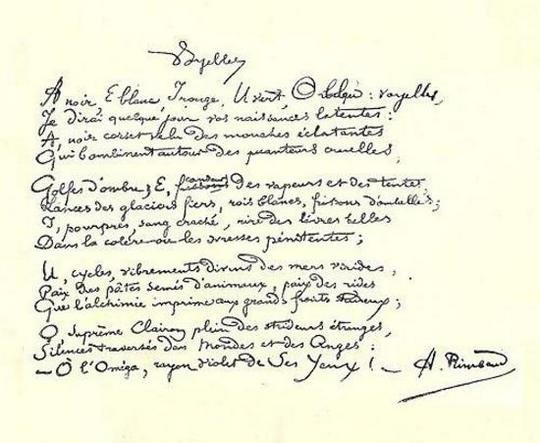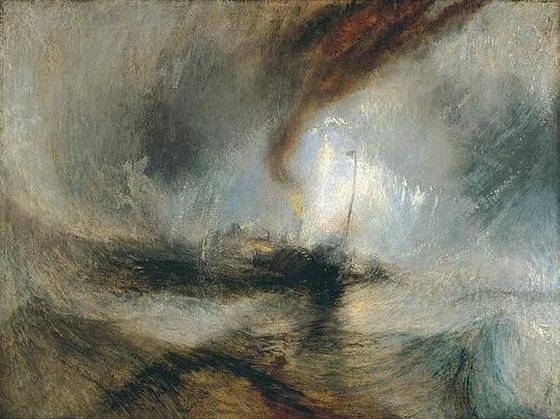ADSactly Poetry: Arthur Rimbaud, The Seer Poet of Modernity (Part III)

Dear readers, in the last post we learnt all about the young genius that was Rimbaud, one of the most prolific authors of modern poetry, of whom we had made a general presentation. We will continue this study with two of his great poems.
***
A large part of the itinerary that will cover Rimbaud's poetry intensely and briefly must be seen in the light of the conception already pointed out, which is present in his Letter of the Seer. Rimbaud consciously assumed his commitment to poetry, and for this he put into practice an "inverse asceticism" (as Todó points out), with a progressive sensory and mental disorder. That is why he had said, in that letter: "I want to be a poet and work to make myself blind".
"Vowels" (1870)
It is a poem that belongs to that moment in which Rimbaud is entering - despite its previous influence (Parnasiana), hence the soneto form - the encounter with a poetic language of its own, which manifests itself in violating the syntax and in the adoption of dialectal words and new words.
Rimbaud has chosen to give an almost absolute freedom, hitherto unknown, to words and their images, and in so doing has initiated poetry along the path of psychic automatism that will be cultivated by the Surrealists in the 1920s and 1930s.

Black A, white E, red I, green U, blue O: you vowels,
Some day I'll tell the tale of where your mystery lies:
Black A, a jacket formed of hairy, shiny flies
That buzz among harsh stinks in the abyss's bowels;
White E, the white of kings, of moon-washed fogs and tents,
Of fields of shivering chervil, glaciers' gleaming tips;
Red I, magenta, spat-up blood, the curl of lips
In laughter, hatred, or besotted penitence;
Green U, vibrating waves in viridescent seas,
Or peaceful pastures flecked with beasts furrows of peace
Imprinted on our brows as if by alchemies;
Blue O, great Trumpet blaring strange and piercing cries
Through Silences where Worlds and Angels pass crosswise;
Omega, O, the violet brilliance of Those Eyes!
Various interpretations of this poem have been made. Here we can only point out that, although it could have some relation with the correspondences proposed by Baudelaire in his famous poem, in the sense of the analogy between sensations (synesthesia), Rimbaud's poem cannot be reduced to it, it goes much further: it creates unthinkable analogies, which are not reduced to the strictly synaesthetic; it is the expression of that freedom that begins to be radical. In the first place, we are faced with an unthinkable trait: vowels can have a meaning beyond their phonic or graphic alphabetical existence. The poem presents an evident game between what a vowel can mean - the normal sense of its use - and another invented by the poet from a completely free relationship, given by the sensations and visions of the speaker. When we read the poem we discover a pre-surrealist landscape, we reinvent in ourselves the vowels, those that invent our everyday language without realizing it.
"The Drunk Ship" (1871)
Some scholars put forward the idea that the poem "The Drunk Ship" and the book (or long poem) A Season in Hell (which we will deal with in the next post) are the poetic narration of Rimbaud's moral course, of "his titanic struggle against the limits" of reality, words, ideas and their constructions. We share this interpretative proposition, but we would have to see how it becomes concrete.
Let's read some of that singular and capital poem, of which, because it is extensive (25 stanzas), we will only transcribe a few of them:
And from that time on I bathed in the Poem
Of the Sea, star-infused and churned into milk,
Devouring the green azures; where, entranced in pallid flotsam,
A dreaming drowned man sometimes goes down;
(…)
But now I, a boat lost under the hair of coves,
Hurled by the hurricane into the birdless ether,
I, whose wreck, dead-drunk and sodden with water,
neither Monitor nor Hanse ships would have fished up;
(…)
But, truly, I have wept too much! The Dawns are heartbreaking.
Every moon is atrocious and every sun bitter:
Sharp love has swollen me up with heady langours.
O let my keel split! O let me sink to the bottom!
(…)
If there is one water in Europe I want, it is the
Black cold pool where into the scented twilight
A child squatting full of sadness, launches
A boat as fragile as a butterfly in May.
(Original in French, full version in English and in Spanish)
The very metaphor of conceiving oneself as a "drunken ship", and assuming that voice, is already a boldness. If a boat in the currents of marine or fluvial waters is already subject to the ups and downs, one drunk duplicates that sense. We know that drunkenness, in its broadest meaning, marked Rimbaud's life, whether through the consumption of wormwood, wine, hashish or other substances, or through his risky and unconventional conduct. Thus, the poem would be the extensive metaphor (non-allegory) of a journey through strange or ignored spaces, such as life; between surprise and adversity, wonders and traffic jams; the vision of a ship almost directed at the shipwreck, although in the end the vision of the lost childhood arises through a simple and, at the same time, terrible nostalgia.
Bibliographic references
Balakian, Anna (1969). The symbolist movement Spain: Edit. Guadarrama.
Rimbaud, Arthur (1980). Complete work (bilingual edition) (10th edition). Spain: Libros Río Nuevo
Todó, Lluís (1987). The Symbolism. Spain. Edit. Montesinos.
https://en.wikipedia.org/wiki/Arthur_Rimbaud
We will read again in the final part of this article.
Written by @josemalavem
Click the coin below to join our Discord Server
)
I think all precautious geniuses are lost children in the end.
Their revolutionary visions being the result of their estrangement from the ordinary world we all inhabit.
How many poets can write a poem to something as insignificant as a vowel and produce such powerful metaphors?
When we read examples like the Drunken Ship, we can admire what distinguises an average brain from a brilliant one. Most people have experienced drunkenness and most people moan about it the day after, the famous hangover. Only a poet can transform self-inflicted extreme body sensations into intense reflexions about love, sadness, pride, and folly
Your comment is very wise, @hlezama. Rimbaud was a "terrible child" ("enfant terrible", as the French told him then), but his rebellion, as I have tried to show in my posts, was not nihilistic, it had a purpose, which is expressed very well in the Seer's Letter. Perhaps his effort, of an extreme lucidity, only remained in his radical poetic work, which illuminated contemporary poetry (even philosophy). That's what I'll refer to in the next post. Thank you and greetings.
I already pointed out to you that Temporada en el infierno was one of my favorite Rimabaud works. When we speak specifically of the journey, we speak of life, of existence itself. But also about the journey that the poet must go through to achieve his work. It is not only to enter into his being and search into the depths of the soul, but to take out what is there, to give it form and to show it. Seek words that say what you want to say and make you feel what you want. That can become a borderline and intoxicating experience. That reminds me of a poem by the Venezuelan writer Eugenio Montejo in which he speaks of the impossibility of words to capture all feelings. Thank you for such an excellent post, @josemalavem
Very valuable comment, @nancybriti. Rimbaud spoke of the "alchemy of the verb," and in that phrase I think his conception of poetry and the poet's work is summed up. We know that poetry is the art of the word, of the verb, but Rimbaud also saw it as a process of transfiguration or transmutation, as the alchemists wanted: to transform common minerals into gold; the great Work, as they called it, which was a metaphor for the transformation of man. Always grateful.
Hi, @adsactly!
You just got a 0.32% upvote from SteemPlus!
To get higher upvotes, earn more SteemPlus Points (SPP). On your Steemit wallet, check your SPP balance and click on "How to earn SPP?" to find out all the ways to earn.
If you're not using SteemPlus yet, please check our last posts in here to see the many ways in which SteemPlus can improve your Steem experience on Steemit and Busy.